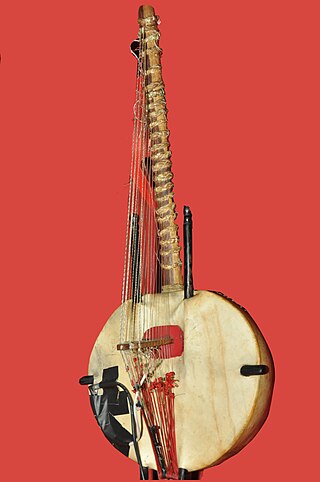
The kora is a stringed instrument used extensively in West Africa. A kora typically has 21 strings, which are played by plucking with the fingers. It combines features of the lute and harp.

Vicente Amigo Girol is a Spanish flamenco composer and guitarist, born in Guadalcanal near Seville. He has played as an accompanying guitarist on recordings by flamenco singers Camarón de la Isla, and Luis de Córdoba, and he has acted as a producer for Remedios Amaya and José Mercé. His album Ciudad de las Ideas won the 2001 Latin Grammy for the Best Flamenco Album and the 2002 Ondas award for the best Flamenco work.
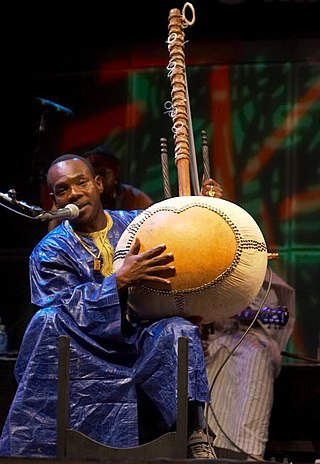
Toumani Diabaté was a Malian kora player. In addition to performing the traditional music of Mali, he was involved in cross-cultural collaborations with flamenco, blues, jazz, and other international styles of music. In 2006, the London-based newspaper The Independent named him one of the fifty best African artists. In its obituary, The Times described him as "a bold and innovative musical visionary".

World Circuit is a British world-music record label, established in London in the mid-1980s, that specializes in Cuban and West African recording artists, among other international music stars. The label's founding principle was to be an artist-led company with all aspects of each release tailored to the artist. This continues to be the label's way of working. World Circuit celebrated its 20th anniversary in 2006 by releasing World Circuit Presents..., a 2-disc retrospective compilation album. In 2018, World Circuit was acquired by BMG Rights Management.

María Rosa García García, better known as Niña Pastori, is a Spanish flamenco singer (cantaora).
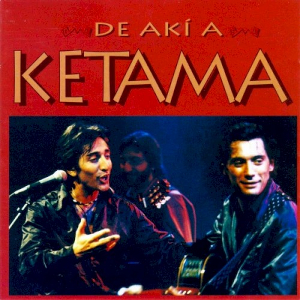
De Aki A Ketama is a fusion flamenco album by Spanish band Ketama. It gave the group mainstream recognition within Spain. The album sold over 600,000 copies.

In the Heart of the Moon is a 2005 record by Malian musicians Ali Farka Touré on the guitar and providing vocals and Toumani Diabaté on the kora. The album was recorded in the "Toit de Bamako" conference room on the top floor of the Hotel Mandé overlooking the Niger River in Bamako, Mali. It is the first in a three-part series released on World Circuit Records entitled "The Hotel Mandé Sessions" followed by Savane and Boulevard de l'Independence. The album's title is derived from Touré's own more lengthy descriptive title for the recording session; "A very important meeting in the realm at the heart of the moon."

Songhai is a fusion flamenco album by Spanish band Ketama, working in collaboration with Malian kora player Toumani Diabaté and other musicians.
Songhai was a world music collaboration between the Spanish flamenco group Ketama, Malian kora player Toumani Diabaté, and English bass player Danny Thompson. They released two albums, Songhai (1988) and Songhai 2 (1994), both co-produced by Joe Boyd.

Antonio Carmona Amaya is a Spanish gypsy singer of flamenco. He also has French nationality. From the early 1980s, he was a member of the Spanish flamenco-fusion group Ketama. that he joined after main vocalist Ray Heredia left. The band also included José Soto also known as "Sorderita". Ketama in its latest set-up included Antonio Carmona as main vocalist along with his brother, Juan José Carmona Amaya known as "El Camborio", and his cousin, José Miguel Carmona Niño known as "Josemi".
Mario Pacheco was a Spanish record producer, photographer and entrepreneur.
Mamadou Sidiki Diabaté is a prominent Mandé kora player and jeli from Bamako, Mali. He is the 71st generation of kora players in his family and a son to Sidiki Diabaté.
Pepe Habichuela is a Spanish flamenco guitarist, cited as one of the great flamenco masters and one of Spain's finest contemporary guitarists. He was born in Granada and belongs to a flamenco dynasty of gypsies started by his grandfather, known as "Habichuela el Viejo", who took the nickname, and continued by his father José Carmona and his brothers Juan Habichuela (1933), Carlos and Luis.
Kélétigui Diabaté was a Malian musician, described as an "undisputed master" of the balafon, and as "one of the greatest figures in Malian contemporary music".
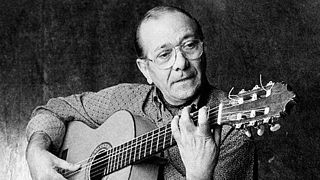
Juan Habichuela was a Spanish flamenco guitarist who began his artistic life as a dancer, and later learned guitar from his father and from a guitarist from Granada known as Ovejilla. He accompanied some of the most famous singers of the time such as Manolo Caracol, Juan Valderrama, Fosforito, and Enrique Morente. He was nominated for the Latin Grammy Award for Best Flamenco Album in 2000. Habichuela received the Latin Grammy Trustees Award in 2012 for "significant contributions, other than performance, to the field of recording during their careers".
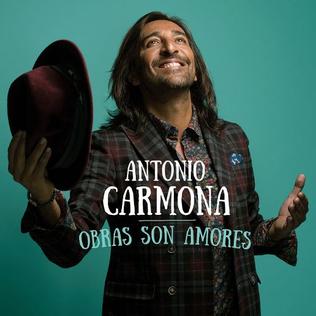
Obras Son Amores is the third studio album by Spanish singer Antonio Carmona. It was released on March 31, 2017, through Universal Music Latin Entertainment. Carmona spent five years working with different artists on songs for the album. Alex Cuba, Claudia Brant, Juanes, Luis Enrique Mejía, and Alejandro Sanz, are some of the artists he collaborated with.

La Macanita is the artistic name of Tomasa Guerrero Carrasco, a Spanish flamenco singer.
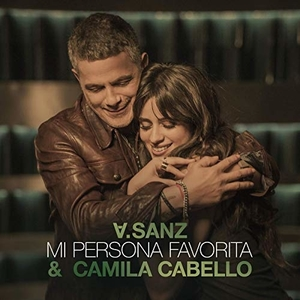
"Mi Persona Favorita" is a song by Spanish singer Alejandro Sanz and Cuban-American singer Camila Cabello, from Sanz's twelfth studio album El Disco (2019). The song was released by Universal Music Spain on March 28, 2019 as the album's third single accompanied by its music video, which first premiered on Sanz's official Vevo channel and directed by American director Gil Green.

New Ancient Strings is a studio album by the Malian musicians Toumani Diabaté and Ballaké Sissoko, released on 22 June 1999 by the British label Hannibal Records. The album comprises eight instrumental duets composed by Diabaté for kora, a stringed instrument of West African music. Diabaté and Sissoko are esteemed as the best and the second-best kora players of their generation, respectively. Their duets were recorded in a single live take within a marble hallway of Bamako's conference centre on the night of 22 September 1997, coinciding with Mali's Independence Day.
Kassé Mady Diabaté was a Malian singer, musician and griot. His soft and particular voice with deep undertones – an atypical characteristic for a griot – earned him the nickname "The golden voice of Mali". He is considered, together with Salif Keita, as one of the greatest Mandinka artists of his generation.













